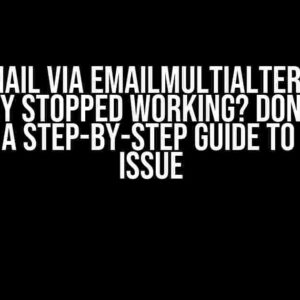Welcome to the world of Python programming, where the thrill of coding meets the agony of debugging! If you’re reading this, chances are you’ve stumbled upon the infamous “Incorrect type of argument in FieldsChunkSerializer” error. Fear not, dear developer, for we’re about to embark on a thrilling adventure to conquer this bug and emerge victorious!
- What is FieldsChunkSerializer, and Why Does it Hate Me?
- Symptoms of the “Incorrect type of argument” Error
- Diagnosing the Issue: A Checklist for Success
- Solution 1: Verify Serializer Fields and Data Types
- Solution 2: Check Data Formats and Serialization
- Solution 3: Update Django and DRF Versions
- Solution 4: Disable Chunking and Pagination
- Conclusion
What is FieldsChunkSerializer, and Why Does it Hate Me?
Before we dive into the solutions, let’s take a step back and understand what’s causing this error. FieldsChunkSerializer is a Python class used in Django’s serialization process. Its primary function is to chunk large datasets into smaller, manageable pieces, making it easier to serialize and deserialize data. Think of it as a heroic chunk-master, saving the day one dataset at a time!
However, when you pass an incorrect type of argument to FieldsChunkSerializer, it throws a tantrum and refuses to serialize your data. This error typically occurs when you’re using a serializer with a generic view or a viewset in Django Rest Framework (DRF).
Symptoms of the “Incorrect type of argument” Error
If you’re experiencing any of the following symptoms, you’re likely dealing with the “Incorrect type of argument in FieldsChunkSerializer” error:
- Deserialize errors when working with large datasets
- Serializer validation errors when passing incorrect data types
- Frustration, hair-pulling, and/or coffee spills
Diagnosing the Issue: A Checklist for Success
Before we get to the solutions, let’s go through a quick checklist to ensure we’re on the right track:
serializer_typeis correctly defined in your serializer- Data is being passed in the correct format (e.g., JSON, XML, etc.)
- You’re using the correct version of Django and DRF
- Serializer fields are correctly defined and match the data types
- You’ve checked for any leading or trailing whitespaces in your data
Solution 1: Verify Serializer Fields and Data Types
Lets’s start by ensuring that our serializer fields match the data types we’re trying to serialize. Open your serializer file and review the fields:
from rest_framework import serializers
from .models import MyModel
class MySerializer(serializers.ModelSerializer):
class Meta:
model = MyModel
fields = ['id', 'name', 'email']
In this example, our serializer has three fields: id, name, and email. Make sure these fields match the data types in your model:
from django.db import models
class MyModel(models.Model):
id = models.AutoField(primary_key=True)
name = models.CharField(max_length=255)
email = models.EmailField(unique=True)
If you’re using a nested serializer, ensure that the fields in the nested serializer match the data types as well.
Solution 2: Check Data Formats and Serialization
Next, let’s verify that our data is being passed in the correct format. If you’re using JSON, make sure it’s properly formatted and without any syntax errors:
{
"id": 1,
"name": "John Doe",
"email": "[email protected]"
}
If you’re using XML, ensure it’s properly formatted and namespace declarations are correct:
<?xml version="1.0" encoding="UTF-8"?>
<root>
<id>1</id>
<name>John Doe</name>
<email>[email protected]</email>
</root>
Solution 3: Update Django and DRF Versions
Sometimes, the issue can be resolved by simply updating your Django and DRF versions to the latest ones. Make sure you’re running the latest versions:
pip install --upgrade django djangorestframework
Solution 4: Disable Chunking and Pagination
If the above solutions don’t work, you can try disabling chunking and pagination in your serializer. This might help identify if the issue is related to chunking:
class MySerializer(serializers.ModelSerializer):
class Meta:
model = MyModel
fields = ['id', 'name', 'email']
chunk_size = None
paginate = False
Conclusion
Victory is within your grasp! By following these solutions and checking your code, you should be able to overcome the “Incorrect type of argument in FieldsChunkSerializer” error. Remember to stay calm, patient, and creative while debugging, and don’t hesitate to seek help if needed.
| Troubleshooting Tip | Description |
|---|---|
| Check serializer fields and data types | Verify that serializer fields match data types in your model |
| Verify data formats and serialization | Ensure data is passed in the correct format (e.g., JSON, XML) |
| Update Django and DRF versions | Update to the latest versions of Django and DRF |
| Disable chunking and pagination | Try disabling chunking and pagination to identify the issue |
Happy coding, and may the debugging force be with you!
Frequently Asked Question
Having trouble with the “Incorrect type of argument in FieldsChunkSerializer” error? We’ve got you covered! Check out these common questions and answers to get back on track.
What causes the “Incorrect type of argument in FieldsChunkSerializer” error?
This error typically occurs when the FieldsChunkSerializer encounters an argument with an incorrect data type. This can happen when the serializer expects a specific data type, such as a string or an integer, but receives a different type instead. For example, passing a list when a string is expected can trigger this error.
How do I fix the “Incorrect type of argument in FieldsChunkSerializer” error?
To fix this error, you need to ensure that the arguments passed to the FieldsChunkSerializer match the expected data types. Review your code to identify the incorrectly typed argument and adjust it accordingly. If you’re still stuck, try debugging your code to identify the root cause of the issue.
What are some common incorrect types that can cause this error?
Some common incorrect types that can trigger this error include passing a list instead of a string, using an integer instead of a float, or providing a dictionary when a string is expected. It’s essential to understand the data types expected by the FieldsChunkSerializer to avoid these errors.
Can I use typecasting to fix the “Incorrect type of argument in FieldsChunkSerializer” error?
Yes, typecasting can be a viable solution to fix this error. By converting the incorrect data type to the expected type, you can resolve the issue. For example, if you’re passing a list but a string is expected, you can use the join() function to convert the list to a string. However, be cautious when using typecasting, as it may lead to unintended consequences if not implemented correctly.
How can I prevent the “Incorrect type of argument in FieldsChunkSerializer” error in the future?
To prevent this error from occurring in the future, make sure to carefully review your code and understand the data types expected by the FieldsChunkSerializer. Implement robust type checking and validation mechanisms to ensure that the arguments passed are of the correct type. Additionally, consider using type hints or annotations to specify the expected data types, making it easier to catch errors early on.





